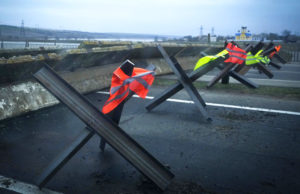Odesa seminary redirects its focus as tensions increase
Shelling near the campus of Odesa Theological Seminary forced administrators to redirect the school’s ministry—using contacts with alumni and students to connect resources to the churches and individuals in need.

In a March 1 email, seminary President Oleksandr Geychenko reported “the tension in and around Odesa is growing.” Most churches in the city cancelled public worship services on Feb. 27 due to the threat of air strikes, he noted.
“On Monday, two shells fell in Kuyalnik estuary, a salt lake a quarter of a mile behind the seminary campus,” Geychenko wrote. “On Tuesday, several shells fell to the north of Odesa at the place where the munition is stored. Thank God they missed the target.”
A few days earlier, when missile blasts forced the evacuation of students from the seminary, officials hoped the seminary campus might be used as a refugee and logistics center.
However, as circumstances changed by March 1, Geychenko wrote it was “hard to imagine” using the seminary facilities in that way. A checkpoint near the seminary monitors movement of people in and out of Odesa, he wrote.
“Odesa is not a harbor for the refugees. Most of them move to Moldova, Romania or further west of Ukraine or abroad,” he stated.
Geychenko said he and his colleagues instead were seeking to “work as a hub, connecting those who have needs with those who have the means to help them.” Seminary personnel are focusing on students, graduates, their churches and the ministries of their congregations, he noted.
‘Tough stories’ from students and alumni
“Communicating with our students, we hear tough stories about their experience of war,” he wrote.
He cited the example of a young family in the region of Sumy who reported “due to heavy shelling, they had to sit in the basement for several days.” Another student in the Chernihiv region reported food shortages in her town.
In spite of the danger, churches continue to hold daily prayer meetings wherever possible, and their members are caring for their neighbors.
“Many Christians volunteer to drive people to safer places, [and] distribute food and water among those who have need. They also dig trenches and guard their neighborhoods as the members of territorial defense units. Churches open their basements for those who do not have places to hide,” Geychenko wrote.
In the port city of Kherson, which was under siege, one student reported a church was sheltering infant orphans in its facility.
“Since the city is surrounded, they cannot evacuate the kids. The volunteers and the citizens are helping them,” he wrote.
In the March 1 email, Geychenko reported he and his colleagues were sending funds to those who were ministering in Kherson, so they could purchase the goods they needed.
Early the following day, the Russian army claimed it had seized control of Kherson, but its mayor asserted the city still was held by Ukrainian forces.
On a personal level, Geychenko expressed concern for friends of his daughter who live in Kharkiv, the nation’s second-largest city.
“Their city was attacked by missiles today. Many civilians died, and the civil infrastructure was destroyed,” he wrote. “It is unimaginable what the aggressor is doing. Senseless cruelty. We keep praying for peace and hope that the aggressors withdraw from our country.”
Slava Gerasimchuk, who teaches Old Testament at Odessa Theological Seminary, managed to get his two children to safety in Moldova when the Russian invasion began Feb. 24. In a March 2 email, he reported he and his wife—along with his mother, two brothers and other relatives—joined their children in Moldova two days earlier.
Most of the seminary faculty now are in the Transcarpathian region near the Hungarian border, he stated.
“Today we had a Zoom meeting to discuss the current situation and the ways of organizing our work during wartime,” Gerasimchuk wrote on March 2. “God willing, we will continue our mission as a theological institution that ‘equips believers to the church, missionary and educational service in the church and society to fulfill the Great Commission of Jesus Christ’ even if we have to do most of the training online for some time.”
Editor’s Note: This article—initially published at 10:50 a.m. on March 2, was updated at 1:30 p.m. after additional information became available. The new information appears in the last three paragraphs.